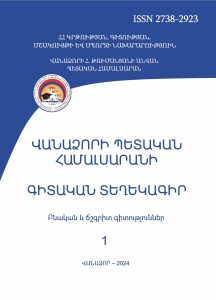Psychological and Pedagogical Aspects
Scientific Proceedings of Vanadzor State University Natural and Exact Sciences (ISSN 2738-2923)
2024 vol 1
Psychological and Pedagogical Aspects of Learning Stochastics and the Formation of Probabilistic Thinking of a School Student in the System of General Education
Lida Avanesyan Armine Sahakyan
Summary

Key words: probability theory, mathematical statistics, combinatorics, thinking, logic, verbal-logical thinking
The article discusses the psychological and pedagogical aspects of learning stochastics and the creation of probabilistic thinking of a pupil. The novelty of the article lies in the fact that the tasks available to children of different ages, depending on age characteristics, were put forward and discussed (for instance, how to give the same assignment to a youngster who is 7-9 years old or older while helping them establish concepts related to probability and chance, etc.).
The problem of discussing this material is that currently, the developers of the new content of the school mathematics course are prioritizing the formation of age and social preparation of pupils to understand certain stochastic processes, as well as the ability to make theoretical generalizations and patterns associated with mass random phenomena. To solve the formulated problem, we set ourselves a purpose to turn to psychology in terms of identifying common patterns of mental and cognitive activity of children of different age groups. Based on the analysis, we came to the conclusion that the use of stochastic elements in teaching mathematics has a direct impact on the formation, development and improvement of all three types of thinking among students.
DOI: https://di.org/10.58726/27382923-ne2024.1-116
